It’s time for part 3 in our “Day in the Life of” blog series. 🙂 This time we’ll talk about writing! Click here for part 1 (QA) and part 2 (Design).
Game writing as a full-time profession is still quite rare. Here at Frozenbyte we currently have one writer, Maija, who’s been with us for over four years now. She started here by writing the stories of Trine 2 and its Goblin Menace expansion (which together form Trine 2: Complete Story). Now she’s been busy with Trine 3: The Artifacts of Power, which is currently available on Early Access on Steam and Humble Store and pre-order & play on GOG.com.
In addition to creating immersive stories and writing the dialogue for our games, Maija also writes user interface texts and sometimes marketing content. She also works closely with our voice actors and manages the process of getting a screenplay from text to the voice studio.
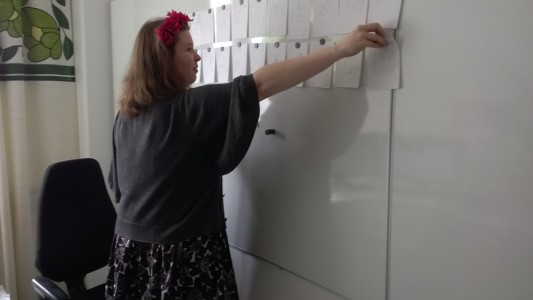
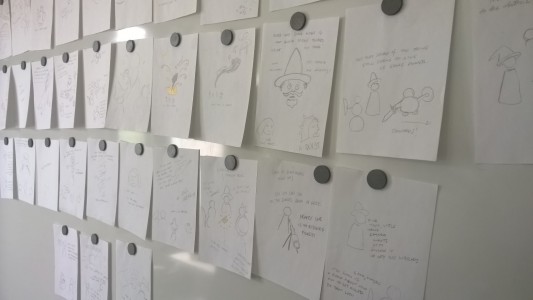
Maija used a storyboard with Trine 3: The Artifacts of Power – you can see some of it in these pictures. Maija likes to keep her storyboard drawings very minimalistic. This way the pictures look a bit goofy and are fun to draw – also this allows her to spend her time actually writing rather than sacrificing hours on drawing detailed artworks.
Writing for games is a dream job for many people – what could be better than letting your imagination run wild and see your stories and characters brought to life by talented artists, designers and coders? It’s much more than though – it’s a very different thing to write for games than to write a book, for example. While it’s definitely a position where a creative mind is needed, it is also very challenging – the writing needs to fit the current game and the parameters are usually affected heavily by the game’s artistic and game design choices.
A game writer has to be able to work with the rest of the design team and always consider the gameplay first hand – while a great story is important, it can’t come at the expense of the gameplay experience. Balancing these aspects can be challenging, especially since game projects tend to undergo several changes during their production, which means the writer has to constantly be alert and ready to change and tweak things. Like all other designers, the writer also has to be able to make tough choices.
Earlier we gave you the chance to ask questions from Maija. You’ll find some of them below – we also added a few for fun. 🙂 If you have more questions for her, let us know in the comments!
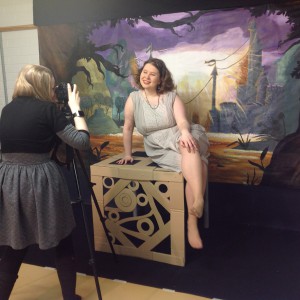
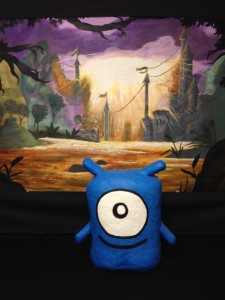
Maija also likes arts & crafts, and has made some decorations for the office on her spare time, such as this Splot statue and Trine 2 painting for our office’s Christmas party last year. The painting was done together with Kaija from our catering team.
How did you end up at Frozenbyte?
I sent an application via email, and they happened to need a writer at the time.
What exactly does game writing involve?
Mostly a lot of typing. Also a lot of meetings and debates. You need to be on the same map with your team and that means as much communication as possible.
What is it like writing specifically for games? How does it differ from writing short stories, novels or scripts for movies or plays, for example?
Your source material is the game’s design document, and you need to write something that complements that. I haven’t written films or published novels, so no comment on that, but writing a short story, you’re of course entirely in charge and you don’t have to make compromises with anyone. Unless you’re in some kind of a bizarre situation where some external force controls your writing by compelling you with their mind control ray. You should probably get out of that situation, if that’s the case.
If you’re writing a play with the very real intention of having a certain person produce it, and a certain person direct it, and certain people play the characters in it, you’ll absolutely find yourself closer to what it can be like writing for games, than what it is like writing texts as standalone pieces.
How much say do you have over general design choices? For example, do you have influence over the character’s skills and other game features?
I try and make requests based on what the story needs, but the integrity of the design comes first.
Have you ever had to do compromises to the story you’ve been working on or had to change the story because of gameplay elements?
Yes.
Could you walk us through your normal day at work? What kind of things do you usually do?
I start every morning somewhere between 7 and 10 am with porridge and lively banter with our catering staff. They are very hard-working, nice people. After that, I don’t have a normal or average day. Writing often happens. Usually it’s dialogue editing.
What about your job has been the most surprising thing to you?
I had no idea how exciting working with voice actors is, when I started. It’s usually quite intense, since it’s done online across two different time zones, and we’re always on strict deadlines. I have to be very alert and on the ball for quite a few hours through, usually on several consecutive days. I like working with our voice studio very much.
What do you enjoy (most) about your job?
I enjoy the fact that we have a catering staff so much. It’s very practical and saves a lot of time, money and energy, not just for the company, but for the employees too.
I really enjoy it when I get to collaborate on the narrative aspects of a game with my co-workers and with our voice studio.
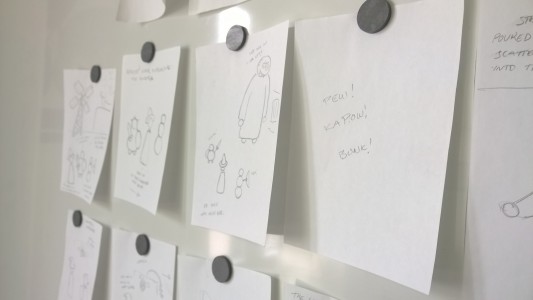
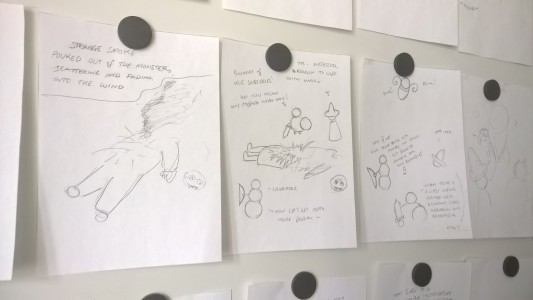
Some close-ups from Maija’s storyboard for Trine 3: The Artifacts of Power. Do you recognize this scene from the game? 🙂
What’s your best advice for people who are not yet in the industry, but would like to write games professionally?
It’s really hard to make a name for you in this business, or get your foot in the door, when your focus is on storytelling. You’d essentially need to learn coding, art, animation and game design in order to showcase your skills if you want to make a game in your portfolio. Mastering all that, and your primary field of interest, is incredibly time consuming and difficult, and while having a superficial knowledge of each discipline is very helpful, it’s also time away from writing..
I’m not aware of many other game writers besides myself having a degree in this field. I think being lectured on structure analysis by an art school screen writing professor was amazing, but for some reason people tend to look down on education in this particular field. You can study screen writing from books also, if university is not an option for you. The important thing is that you realize you can learn and grow as a writer in other ways than just typing words in a text editor.
You’ll want to pad your portfolio with an emphasis on projects that show you can communicate and collaborate with people from outside the writing sphere, so you can eliminate some of your problems with the magic of team work. Somewhere, there are coders, artists and game designers looking to work with a writer so they can get a kick-ass game project in their portfolio. And if that is not a viable option, go analogue – make board games, or stage plays, or role playing games. Engage with your audience, expand your horizons, and learn by doing!
And then you stick to it. You’ll do projects, and you never give up.
Also, understanding the finer points of game design will also take you places.
I often wish that place was a waffle stand.
Next we’ll be having a chat with some members of our programming team, so if you have any questions for them, you can leave those in the comments. 🙂

One comment on “Day in the Life of Frozenbyte Writing”
How much would you, as Programmers, like your Designers to understand the vocabulary and mechanisms of your Art?
And even though this question isn’t strictly to programmers, how much do Designers feel, that their knowledge in programming has helped them forward when designing a game?
More vague, a bit political question: how do you feel about programming curriculum in Finnish schools as it is today?
Leave a Reply